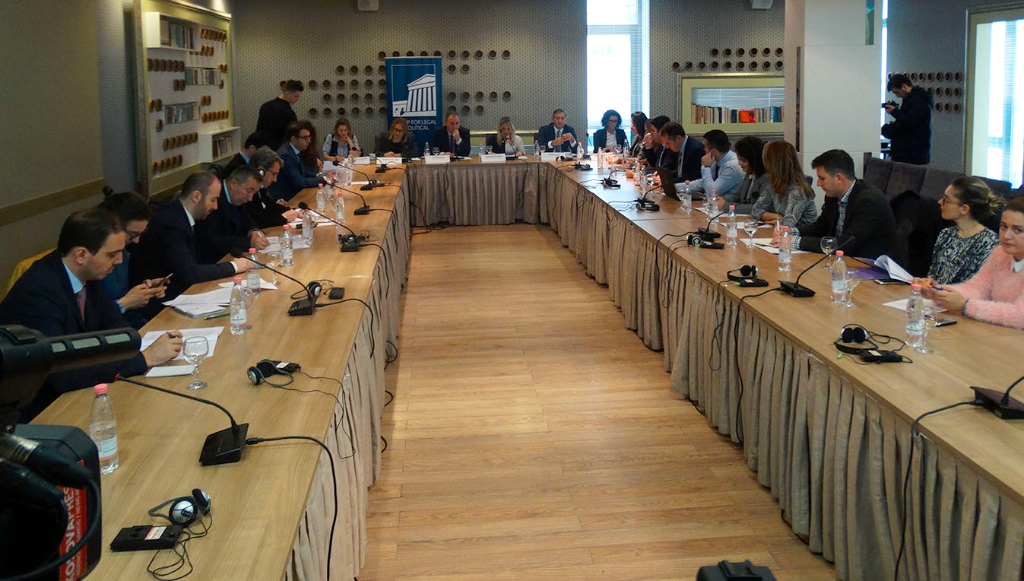On December 1, Group for Legal and Political Studies (GLPS) organized a Roundtable Discussion on the topic: “Regional Economic Area for the Western Balkans: broader trade implications and implementation challenges for Kosovo”, held in Prishtina. The aim of this event was to discuss the added value of the Regional Economic Area (REA) for the region and Kosovo in particular, as well as the challenged that may adversely affect its implementation. At the beginning of the event, GLPS presented a draft of a Policy Analysis that discusses the wider trade implications of the REA and the challenges of its implementation for Kosovo, which will be soon published. In addition, the panelists focused the discussion on the potential strategic approaches that Kosovo should employ in order to best utilize this agreement, what it brings for Kosovo, as well as any implications it might entail for Kosovo in particular, in addition to the regional context. Furthermore, they discussed the risks associated to the possibility of introducing customs regimes within the Regional Economic Area and the implications for Kosovo at a time when EU enlargement is not on the priorities of the European Union agenda. “REA intends to boost economic development of the WB area, through deepening the integration of the WB countries”, stated Ms. Loxha, the author of the paper. In addition, the Deputy Prime Minister of Kosovo, Mr. Limaj said that Kosovo’s position towards REA remains a determinant for country’s economic future. Thus, Kosovo should not allow additional burdens that will not be able to benefit from, but should employ a strategic approach toward utilizing this opportunity. Next to address the audience was the Minister of Innovation and Entrepreneurship, Mr. Beqaj, who stated that it’s crucial that the economic integration provided with REA’s format should correspond with the equality and mutual respect of the political identity that each of the Western Balkans countries have. On the other hand, the former minister of Trade and Industry, Ms. Bajrami argued that actual economic indicators in Kosovo do not provide any hope that Kosovo can be successful or benefit from the Regional Economic Area. Following the discussion, Ms. Johansson from the European Union in Kosovo reiterated the fact that the EU continues to support the economic integration of the WB countries and REA is one of the factors that contributes on this regard. To conclude the event, Ms. Latifi-Jashari, the Executive Director of Institute for Advanced Studies GAP, said that problems encountered by Kosovo during the time of CEFTA make Kosovo’s perspective within REA rather vague. Finally, this Roundtable served as an opportunity to initiate a coherent and open dialogue with the representatives of the all levels to scrutinize what challenges Kosovo faces during the implementation of this important economic agreement, how should Kosovo institutions approach the requirements and challenges deriving from REA and what could civil society do to effectively enhance coordination and utilize this agreement.
Panelists:
Mr. Fatmir Limaj – Deputy Prime Minster of Kosovo;
Mr. Besim Beqaj – Minister of Innovation and Entrepreneurship;
Ms. Hykmete Bajrami – Member of the Parliamentary Committee for Economic Development;
Ms. Anastasia Johansson – Policy Officer, EU Office Kosovo;
Ms. Nora Latifi-Jashari – Executive director, GAP Institute;
Ms. Arbëresha Loxha – Group for Legal and Political Studies.
Venue: Orion Conference Centre, Prishtina.
Share article
Latest Publications
April 24, 2024
Policy Analysis
Tracking Kosovo's Commitment: Monitoring Adherence to the Venice Commission Rule of Law Checklist in ...
April 8, 2024
Policy Analysis
Reflecting on the Third Year of Kurti II: Setbacks and Achievements in Rule of Law, Public Administr ...
March 22, 2024
Policy Analysis
Lost, “in the Twilight Zone” Rebutting the Court’s Blunder
Related Espresso Insights
March 4, 2024
Espresso.Insights
Passport Hangover: What’s next after Spain’s Kosovo breakthrough?

January 16, 2023
Espresso.Insights
Recognized but not supported: Hungary's stance on Kosovo's EU bid





